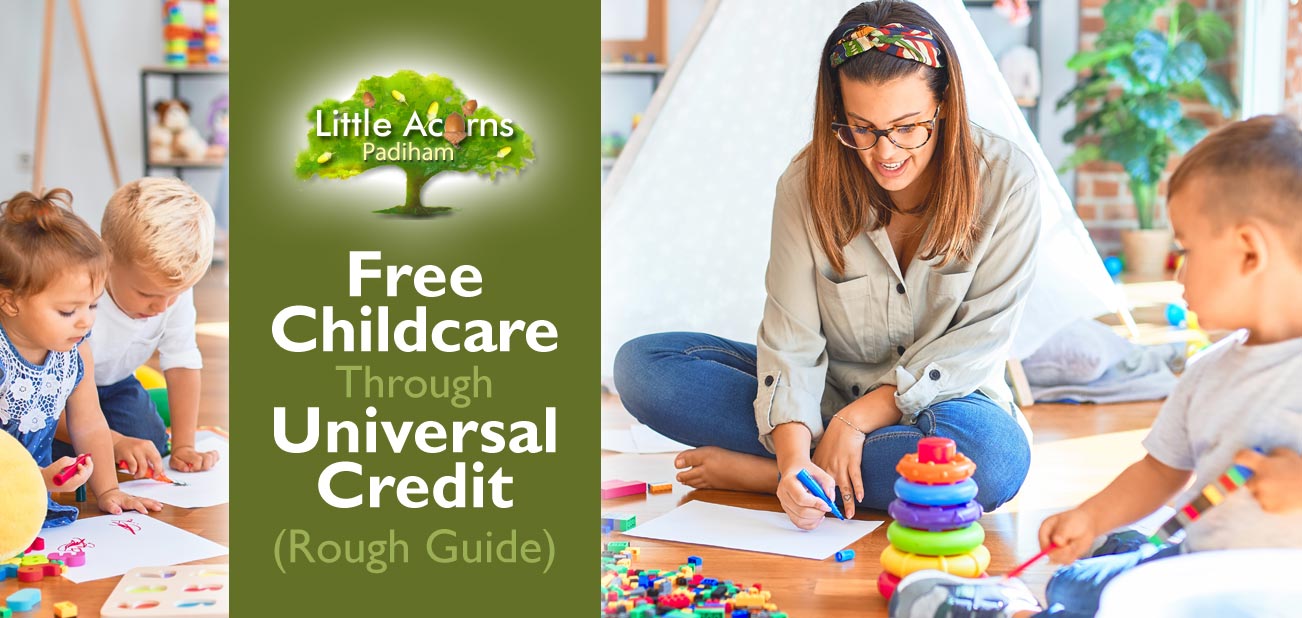
In today’s post, the third in our series of guides about Government childcare funding schemes, we look at free childcare funding available through Universal Credit. This is particularly timely because the scheme becomes significantly more generous from the 28th of June 2023, so eligible families will start benefitting just as today’s guide goes live. The changes come into effect following commitments made by the Chancellor of the Exchequer in his Spring Budget back in March. They make childcare funding through Universal Credit more generous and easier to fund. We will explain what we mean by that, as well as outline the facts, figures and eligibility requirements for the scheme, in our guide to Free Childcare Through Universal Credit below.
How Much Free Childcare Can You Get Through Universal Credit?
If you are eligible for free childcare through Universal Credit, here’s what you can claim from 28th June 2023:
- The maximum families can claim through Universal Credit Childcare Support is 85% of eligible childcare costs, up to the maximums outlined below.
- You can get up to £951 in free childcare each month for one child.
- You can receive up to £1,630 in free childcare each month for two or more children.
- That’s an increase of almost 50% from the previous maximums before late June 2023.
- The maximums outlined above will increase in line with the Consumer Price Index (CPI) annually until 2027/28 according to the Department of Work & Pensions (DWP).
- You may also be able to claim for childcare costs during your child’s nursery settling-in period or for childcare while you travel to work if they’re deemed by DWP to be ‘reasonable’ in helping you to get back into work.
- Another major improvement is that the funding through this scheme may be partly pre-funded by the Government in some circumstances, rather than families having to find the significant sums, and then claim them back retrospectively. We’ll explain more about that later in this guide.
N.B. If you already have some of your childcare fees paid by your employer through childcare vouchers, you can only claim the balance of childcare fees that you are responsible for funding — not the part already covered by the vouchers. Similarly, if you already have some of your childcare fees covered through free childcare hours for 2-year-olds or free childcare hours for 3- and 4-year-olds, you can only claim for any additional hours, if eligible, that you would otherwise have to pay.
Why is the Government Helping in This Way?
“These changes will help thousands of parents progress their career without compromising the quality of the care that their children receive.” — Mel Stride, Secretary of State for Work & Pensions.
The free childcare funding through Universal Credit is aimed at helping low-income families and those wishing to either return to work or significantly extend existing working hours. This will help children, parents/caregivers — especially women — and will also boost the economy as more people move back into work. The Government is also aware that there are huge benefits associated with a good early years education, particularly when it’s started young. Those benefits extend to a huge range of things including the children’s life outcomes, improved careers, increased earning potential and multiple benefits to society in general. Follow the bold link for more details.
“By helping more parents to re-enter and progress in work, we will be able to cut inactivity and help grow the economy.” — Mel Stride, Secretary of State for Work & Pensions.
Are You Eligible for Free Childcare through Universal Credit?
As mentioned above, the changes to childcare support through Universal Credit are designed specifically to help low-income families, those wishing to return to work, or people wishing to extend existing hours. With that in mind, the eligibility requirements for childcare funding through Universal Credit are as follows:
- Firstly families must, of course, be claiming Universal Credit in order to access the childcare element of it. You can learn more about who is eligible for Universal Credit here. Generally speaking, though, Universal Credit is mostly intended for UK people aged over 18 but below State Pension age who are on low incomes, need help with living costs, and have savings/investments of no more than £16k. Your partner’s circumstances, if you live with them, may affect your eligibility for Universal Credit. There are other exceptions and caveats, too, so follow the bold link above for more information about eligibility for Universal Credit itself.
- With regard to support for childcare funding available through Universal Credit, you and your partner, if you have one, need to be working in a paid job — or have received and accepted a job offer for paid work starting within the next month. That’s with the exception of those unable to work through disability, bad health, or temporary absence from the household e.g. through hospitalisation or going into residential care. Your child may also still be eligible if your partner has to care for a severely disabled person for whom they are eligible to receive Carer’s Allowance.
- You must live in the UK and the child(ren) for whom you are claiming childcare costs needs to be dependent upon you.
- You usually need to be over 18, although there are some circumstances where those aged 16 or 17 may be able to claim.
- You can claim against childcare costs for dependent child(ren) until the August following their 16th birthday.
- The childcare provider may be a nursery, preschool, childminder, nanny, or even a breakfast, after-school or holiday club — so long as they’re properly registered in the UK. Generally, that means that they need to be registered with Ofsted if the childcare is in England, or their equivalent if it’s in Scotland or Wales. You’ll need to provide their registration number when applying for the childcare funding.
- If your circumstances change, it could affect your eligibility — potentially for both Universal Credit itself and the Childcare Support element of it. So, confirm straight away if, for example, you, or your partner if you have one, earn more than originally stated, lose your job, or stop work for some other reason.
Can You Get Childcare Costs Paid Upfront?
 Usually, you will need to pay for childcare costs first and then reclaim them through your Universal Credit childcare support account. However, there are some circumstances where you may be able to get some of your childcare costs paid upfront through the scheme. This recent change is designed to help families essentially with cash flow so that a major barrier to working is removed. That, in turn, will also help the economy.
Usually, you will need to pay for childcare costs first and then reclaim them through your Universal Credit childcare support account. However, there are some circumstances where you may be able to get some of your childcare costs paid upfront through the scheme. This recent change is designed to help families essentially with cash flow so that a major barrier to working is removed. That, in turn, will also help the economy.
Funding for childcare upfront may be possible in the following circumstances:
- When parents are starting new paid work.
- In the month preceding the start of the new job.
- In the month after the end of employment, to help continue childcare when switching between jobs.
- When parents are significantly increasing their working hours, for example when moving from part-time to full-time employment.
If any of the above scenarios apply, families can speak to their work coach (available through their Universal Credit account) about something called a Flexible Support Fund. If not eligible for that, another potential option is a Budgeting Advance although the latter needs to be repaid.
N.B. Be mindful of keeping the Department for Work and Pensions (‘DWP’) informed in a timely manner in all cases, otherwise you could miss out.
How to Apply for Universal Credit Childcare Support
To apply for Universal Credit payments, create a Universal Credit account here or sign into your account here if you already have one. If you live with a partner, they will also need to have an account and the two must be linked together before you will be able to claim.
N.B. Before applying for the first time, ensure you first read about checks and other useful information you should be aware of here. The telephone number for the Universal Credit Helpline at 0800 328 5644 may also be useful to note.
Once accepted into the scheme, you will need to regularly report and provide evidence of your childcare costs through your account. Remember to claim quickly too otherwise, if you leave claims longer than 2 months, they may not be reimbursed.
More Information
Additional guidance on childcare costs through Universal Credit is available here.
Already Claiming for Childcare Costs through Another Scheme?
You can’t claim through the Tax-Free Childcare Scheme if you are claiming for childcare through Universal Credit. However, you can check which other schemes you may be able to claim in tandem here.
More Improvements to Childcare Funding are Coming Soon
Substantial additional improvements to childcare funding are also in the pipeline following the Spring Budget 2023 announcements. However, we’ll cover those alternative schemes separately here in due course. Just to whet your appetite, though, they include plans to gradually extend free childcare support to eligible children aged from just 9 months from September 2024. So, watch this space!
Little Acorns Nursery & Preschool, Padiham, Lancashire
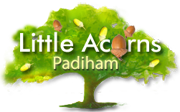 At Little Acorns Nursery in Padiham, we support all the Government childcare funding schemes for eligible families. We offer babies, infants, toddlers and preschoolers the very best start in life, the highest quality childcare and an unbeatable early years education. This combination will bring out the best in them and ensure they absolutely thrive from the moment they begin school around the age of five. To get started on applying for a nursery/preschool place, to arrange a free guided tour or simply to get in touch to ask a question, please select a button below:
At Little Acorns Nursery in Padiham, we support all the Government childcare funding schemes for eligible families. We offer babies, infants, toddlers and preschoolers the very best start in life, the highest quality childcare and an unbeatable early years education. This combination will bring out the best in them and ensure they absolutely thrive from the moment they begin school around the age of five. To get started on applying for a nursery/preschool place, to arrange a free guided tour or simply to get in touch to ask a question, please select a button below:
Little Acorns Nursery and Preschool is located in Padiham, Lancashire. We’re also close to Hapton, Rose Grove, Burnley, Altham, Huncoat, Read, Simonstone, Sabden, Higham, and Wood End, so may also suit families requiring childcare near those locations.
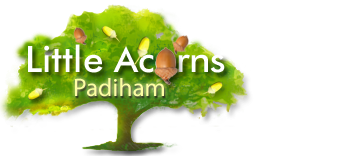
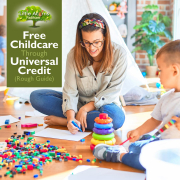
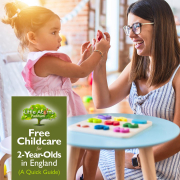
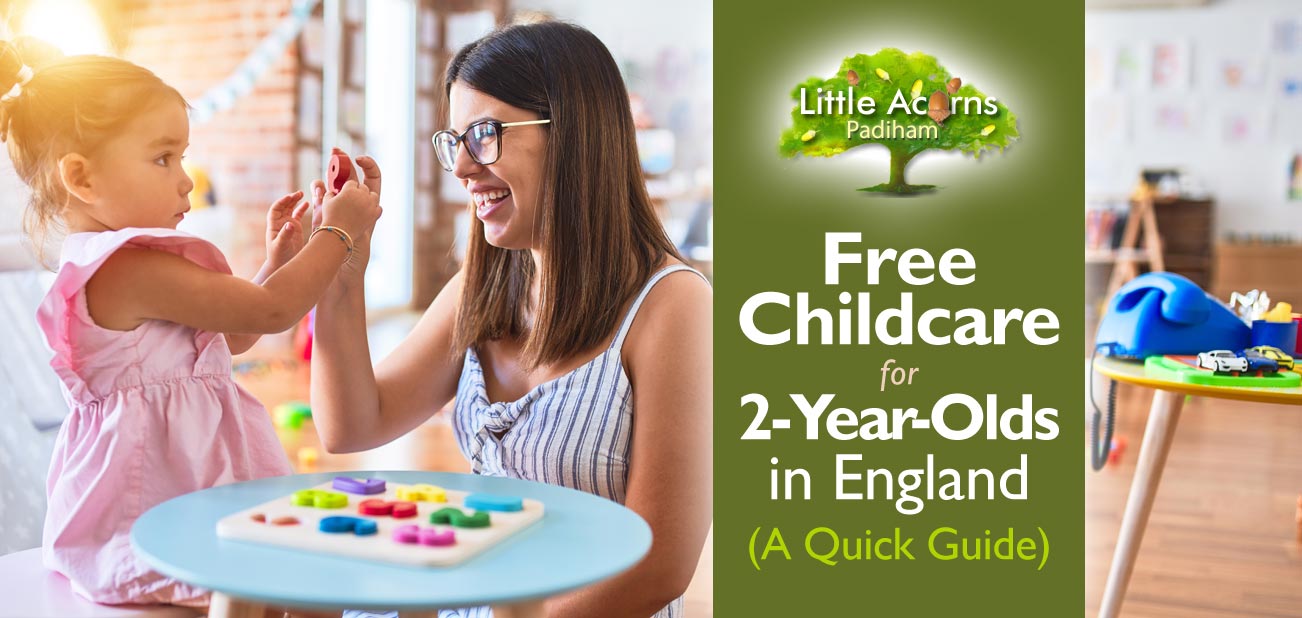
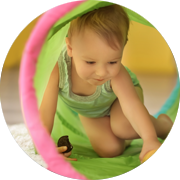 Eligible 2-year-olds can get a total of 570 free childcare hours during the course of a year. The entitlement is usually taken as 15 hours per week over 38 ‘term time’ weeks. However, families may wish to ask childcare providers if they can use the hours in a different way. For example, some may wish to stretch the hours out over 50 or so weeks of the year, in which case it would equate to approximately 11½ free hours per week. The nursery or childcare provider would need to confirm what’s possible. Any extra hours will need to be paid for by the family and the same is usually true for things like nappies, special trips and meals. Even so, 570 free childcare hours should really help families and may allow a stay-at-home parent to get back into the workplace sooner, even if only part-time.
Eligible 2-year-olds can get a total of 570 free childcare hours during the course of a year. The entitlement is usually taken as 15 hours per week over 38 ‘term time’ weeks. However, families may wish to ask childcare providers if they can use the hours in a different way. For example, some may wish to stretch the hours out over 50 or so weeks of the year, in which case it would equate to approximately 11½ free hours per week. The nursery or childcare provider would need to confirm what’s possible. Any extra hours will need to be paid for by the family and the same is usually true for things like nappies, special trips and meals. Even so, 570 free childcare hours should really help families and may allow a stay-at-home parent to get back into the workplace sooner, even if only part-time. Children aged two that live in England may be eligible if their parents/household are in receipt of one or more specific Government benefits. These include:
Children aged two that live in England may be eligible if their parents/household are in receipt of one or more specific Government benefits. These include: If none of the benefit-related criteria above applies, children aged 2 may still qualify for the childcare funding scheme in the following circumstances:
If none of the benefit-related criteria above applies, children aged 2 may still qualify for the childcare funding scheme in the following circumstances: The last category of eligible claimants is some 2-year-olds living in England who are non-UK citizens, whose households cannot claim benefits and whose household income is below a certain threshold. Thresholds vary from £26,500 to £38,600 depending on how many children the family has and whether they live inside or outside of London.
The last category of eligible claimants is some 2-year-olds living in England who are non-UK citizens, whose households cannot claim benefits and whose household income is below a certain threshold. Thresholds vary from £26,500 to £38,600 depending on how many children the family has and whether they live inside or outside of London.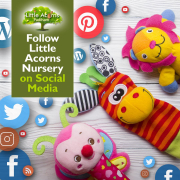
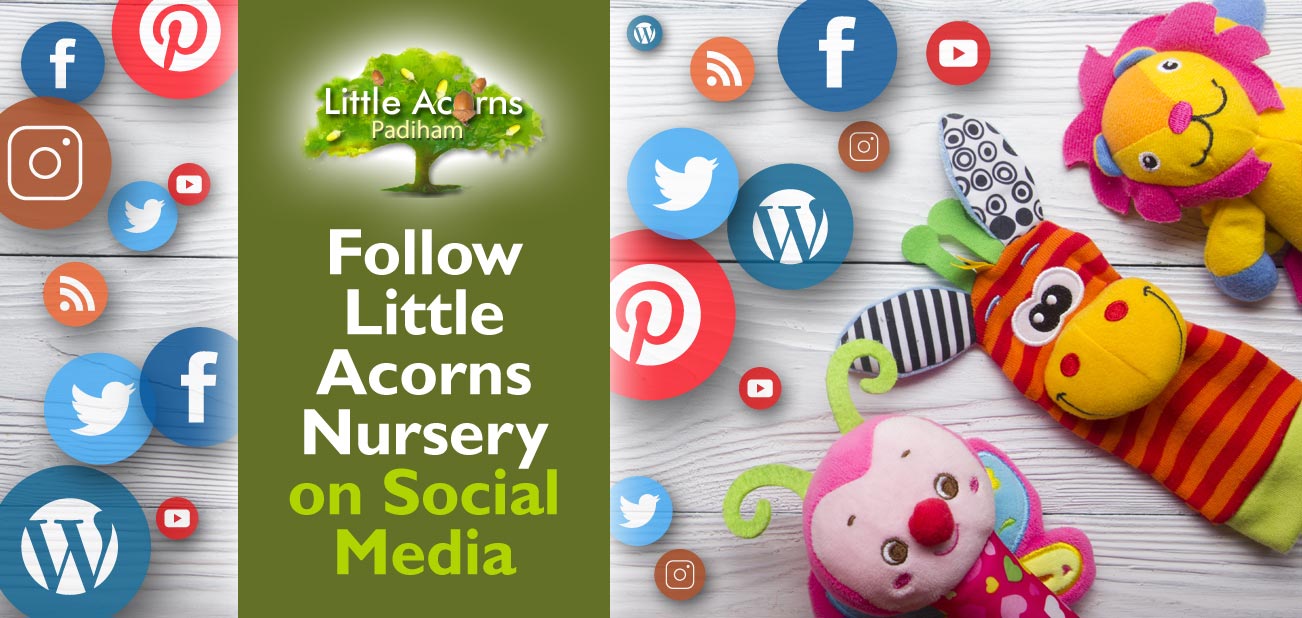
 This is what we call our blog (short for ‘web log’) where we regularly publish guides and useful information for parents of children under five.
This is what we call our blog (short for ‘web log’) where we regularly publish guides and useful information for parents of children under five.  We’re @NurseryPadiham on Twitter, so you can follow us at
We’re @NurseryPadiham on Twitter, so you can follow us at  We’re @TotsNursery on Facebook (because we took over the Adventure Tots childcare business), so you can follow us at
We’re @TotsNursery on Facebook (because we took over the Adventure Tots childcare business), so you can follow us at  We’re @LittleAcornsNurseryBB12 on Instagram, so you can follow us at
We’re @LittleAcornsNurseryBB12 on Instagram, so you can follow us at  We’re also @LittleAcornsNurseryBB12 on Pinterest, so you can follow our pins and boards at
We’re also @LittleAcornsNurseryBB12 on Pinterest, so you can follow our pins and boards at  We appreciate that, if you’re reading this, you’ve already found us. However, if you ever need to find us again and aren’t sure where to look, we’re also on Google.
We appreciate that, if you’re reading this, you’ve already found us. However, if you ever need to find us again and aren’t sure where to look, we’re also on Google. 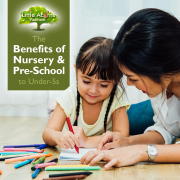
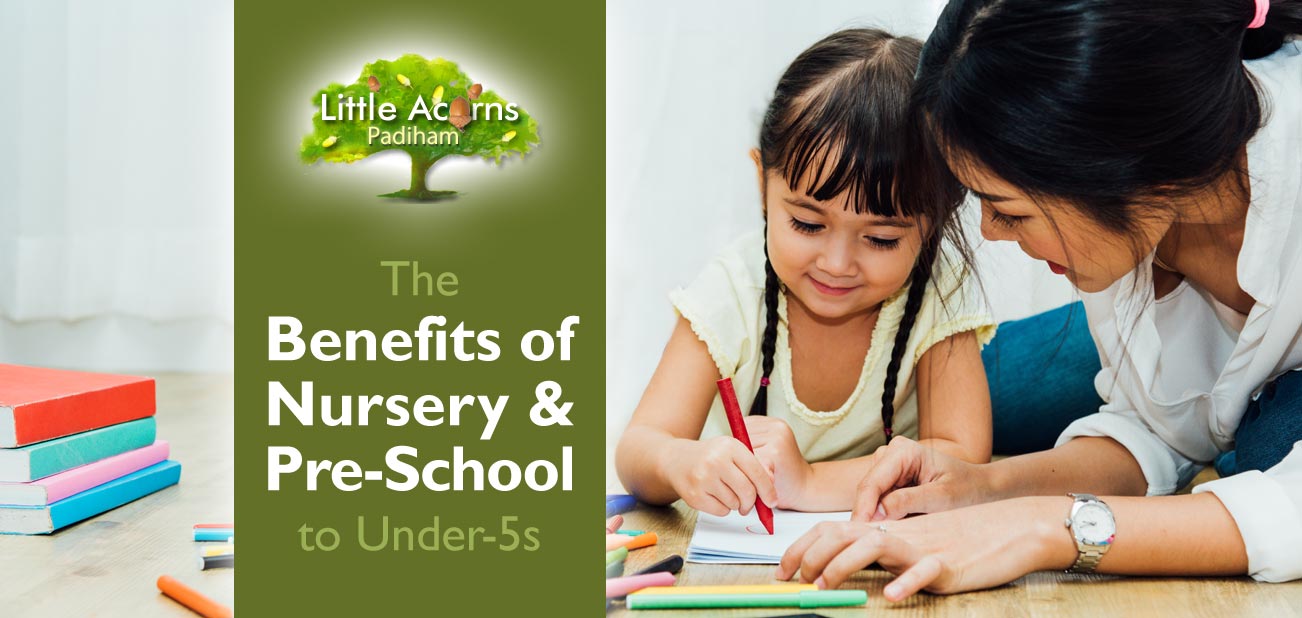
 A good nursery or pre-school is so much more than just a crèche, playgroup, kindergarten or childminding service.
A good nursery or pre-school is so much more than just a crèche, playgroup, kindergarten or childminding service.  Nurseries like Little Acorns in Padiham provide a dynamic environment where children mostly learn through different types of play and pre-planned, carefully structured activities. Much of their learning is achieved through the application of the
Nurseries like Little Acorns in Padiham provide a dynamic environment where children mostly learn through different types of play and pre-planned, carefully structured activities. Much of their learning is achieved through the application of the  A good early years childcare provider like Little Acorns will also nurture every aspect of children’s personal development. Research suggests that starting childcare and a good early years education at a young age can have significant positive effects on children’s development.
A good early years childcare provider like Little Acorns will also nurture every aspect of children’s personal development. Research suggests that starting childcare and a good early years education at a young age can have significant positive effects on children’s development. Spending time at nursery and pre-school provides children with countless opportunities to interact with peers and to learn to socialise with others. Through doing so, they’ll develop their social skills generally, including things like learning good manners, needing to sometimes share or take turns, learning about mutual respect, and following rules.
Spending time at nursery and pre-school provides children with countless opportunities to interact with peers and to learn to socialise with others. Through doing so, they’ll develop their social skills generally, including things like learning good manners, needing to sometimes share or take turns, learning about mutual respect, and following rules.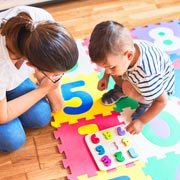 Good nurseries and pre-schools like Little Acorns welcome and support children of all abilities. As part of this and whenever possible, they will create an inclusive environment for children with special educational needs or disabilities (SEND). They’ll support them in every way they can including, where possible, provision of special equipment, adapting the environment to make it more accessible, and obtaining additional funding for extra resources. They’ll even work with outside professionals, where appropriate, to develop the best ‘joined-up’ plan to support children. The result is a positive and responsive culture where children feel comfortable and valued, irrespective of ability or disability.
Good nurseries and pre-schools like Little Acorns welcome and support children of all abilities. As part of this and whenever possible, they will create an inclusive environment for children with special educational needs or disabilities (SEND). They’ll support them in every way they can including, where possible, provision of special equipment, adapting the environment to make it more accessible, and obtaining additional funding for extra resources. They’ll even work with outside professionals, where appropriate, to develop the best ‘joined-up’ plan to support children. The result is a positive and responsive culture where children feel comfortable and valued, irrespective of ability or disability.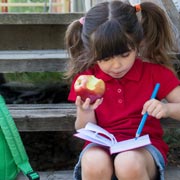 All of the above will really help children to develop the skills and confidence they need to absolutely thrive once they start at primary school. As well as being more able and literate from the moment they start, they’ll more easily be able to follow routines, listen to instructions, and work independently. They’ll absolutely hit the ground running with the existing knowledge, tools and abilities that they learned during their all-important early years. Indeed, those children who receive a high quality early years education have been shown to attain higher grades in their GCSEs and can be the equivalent of a year ahead by the time they reach the age of 15.
All of the above will really help children to develop the skills and confidence they need to absolutely thrive once they start at primary school. As well as being more able and literate from the moment they start, they’ll more easily be able to follow routines, listen to instructions, and work independently. They’ll absolutely hit the ground running with the existing knowledge, tools and abilities that they learned during their all-important early years. Indeed, those children who receive a high quality early years education have been shown to attain higher grades in their GCSEs and can be the equivalent of a year ahead by the time they reach the age of 15.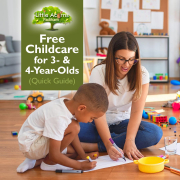
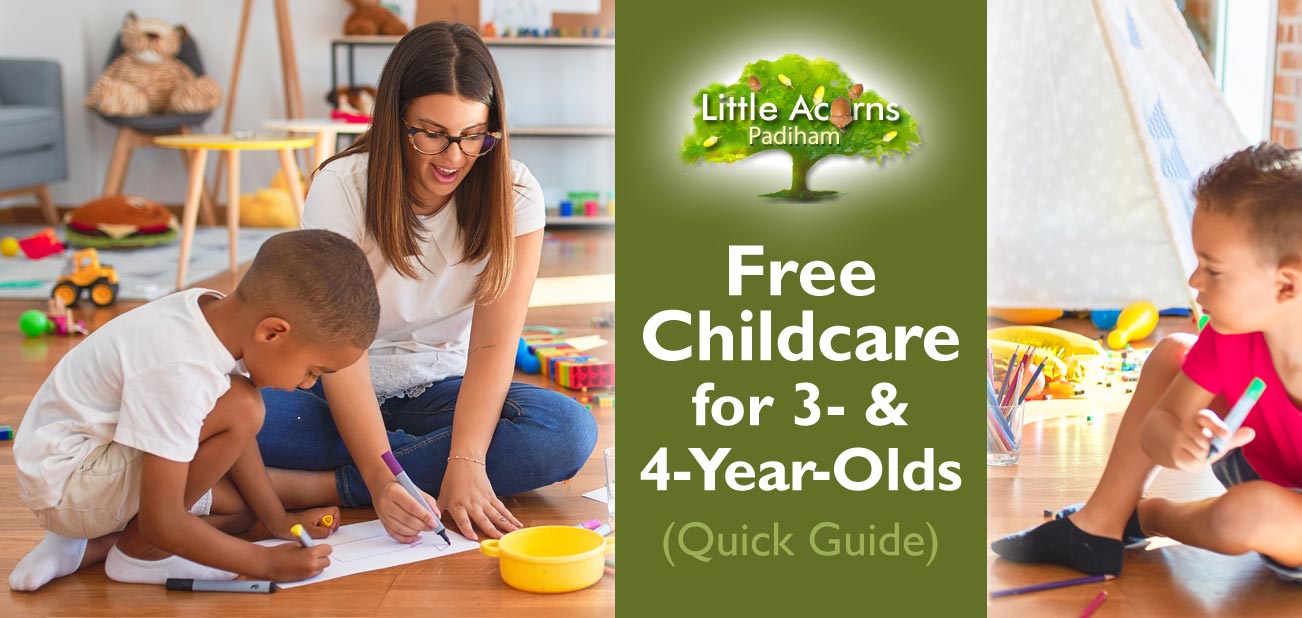
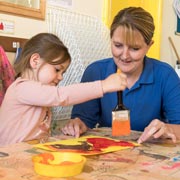 If you live in England and have a child aged 3 or 4, this article is for you. Did you know that your child is entitled to free childcare each week? In fact, virtually all children aged 3 or 4 that live in England can get an impressive 570 hours of free childcare each year. Some can even get twice that amount of funded childcare hours. Today we’ll go through what’s available – totally free of charge – and the rules around eligibility.
If you live in England and have a child aged 3 or 4, this article is for you. Did you know that your child is entitled to free childcare each week? In fact, virtually all children aged 3 or 4 that live in England can get an impressive 570 hours of free childcare each year. Some can even get twice that amount of funded childcare hours. Today we’ll go through what’s available – totally free of charge – and the rules around eligibility.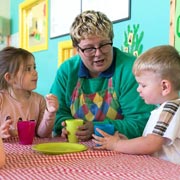 The ‘15 Hours Free Childcare’ scheme is a Government-funded initiative that provides free early education and childcare for all 3- and 4-year-olds living in England. Under the scheme, eligible children are entitled to 15 hours of free childcare each week, usually spread over 38 weeks, to total 570 hours per year. Optionally, however, some families may choose to have their child attend a childcare setting for less than 15 hours per week but spread the free hour allowance throughout the whole year. Others may prefer to take longer breaks during the holidays and using the hours more intensively during term time. Parents/guardians will need to check what’s possible with their particular childcare provider (we try to be as flexible as possible at
The ‘15 Hours Free Childcare’ scheme is a Government-funded initiative that provides free early education and childcare for all 3- and 4-year-olds living in England. Under the scheme, eligible children are entitled to 15 hours of free childcare each week, usually spread over 38 weeks, to total 570 hours per year. Optionally, however, some families may choose to have their child attend a childcare setting for less than 15 hours per week but spread the free hour allowance throughout the whole year. Others may prefer to take longer breaks during the holidays and using the hours more intensively during term time. Parents/guardians will need to check what’s possible with their particular childcare provider (we try to be as flexible as possible at 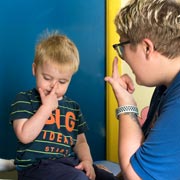 You must be the child’s parent or legal guardian.
You must be the child’s parent or legal guardian.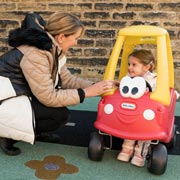 The ‘30 Hours Free Childcare’ scheme is a very similar Government-funded initiative that provides eligible families in England with up to 30 hours of free childcare per week. Again, this is for children aged 3 and 4. The scheme is designed to help working families with the cost of childcare and to support parents who want to return to work or increase their hours.
The ‘30 Hours Free Childcare’ scheme is a very similar Government-funded initiative that provides eligible families in England with up to 30 hours of free childcare per week. Again, this is for children aged 3 and 4. The scheme is designed to help working families with the cost of childcare and to support parents who want to return to work or increase their hours.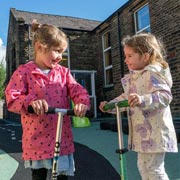 You are usually still be eligible if you are off work on annual leave or sick leave, or parental leave if it is not being taken for the same child you are claiming childcare funding for.
You are usually still be eligible if you are off work on annual leave or sick leave, or parental leave if it is not being taken for the same child you are claiming childcare funding for.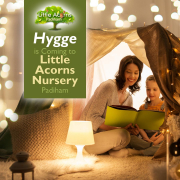
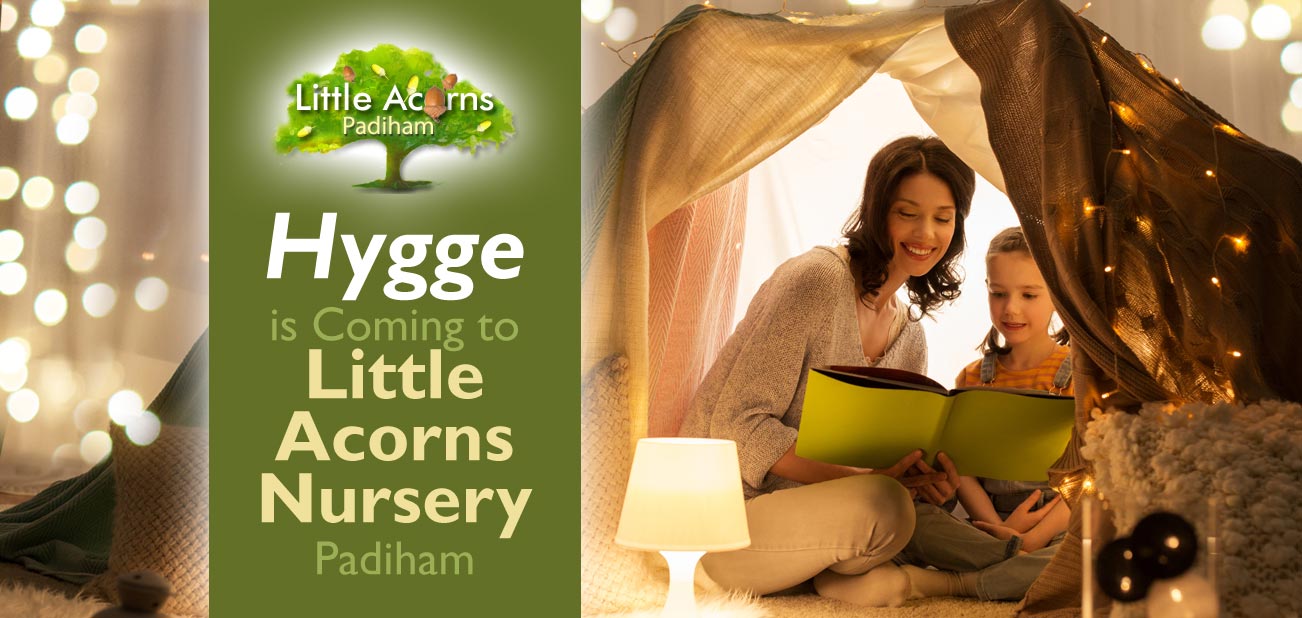
 One of the exciting new initiatives that we have planned for Little Acorns nursery, Padiham, is to make it a Hygge setting. In today’s post, we explain what Hygge means and how it will benefit the setting, especially the children. Once the Hygge initiative has been fully adopted, it will positively transform the whole feel of the nursery and benefit everyone. Introducing Hygge is exciting and the children are going to love it! To be truthful, we can’t wait to get started!
One of the exciting new initiatives that we have planned for Little Acorns nursery, Padiham, is to make it a Hygge setting. In today’s post, we explain what Hygge means and how it will benefit the setting, especially the children. Once the Hygge initiative has been fully adopted, it will positively transform the whole feel of the nursery and benefit everyone. Introducing Hygge is exciting and the children are going to love it! To be truthful, we can’t wait to get started! Counter to the instincts of those whose first language is English, Hygge is pronounced “Hue-Gah” rather than “Hig”. It is popular in Denmark and Norway and is a Danish word that refers to a rather beautiful lifestyle; one of cosiness, homeliness, contentment and comfort. Wellbeing, warmth and conviviality are central to the Hygge approach. Friendliness, a welcoming atmosphere and closer links to nature are key parts of the Hygge way of life too. Having a more simple lifestyle and living far more in the moment are also part and parcel of Hygge. With such facets, Hygge naturally fosters happiness and contentment in everyone that it touches. Indeed, that’s one of the many reasons we can’t wait for both children and staff to start embracing it at Little Acorns Nursery.
Counter to the instincts of those whose first language is English, Hygge is pronounced “Hue-Gah” rather than “Hig”. It is popular in Denmark and Norway and is a Danish word that refers to a rather beautiful lifestyle; one of cosiness, homeliness, contentment and comfort. Wellbeing, warmth and conviviality are central to the Hygge approach. Friendliness, a welcoming atmosphere and closer links to nature are key parts of the Hygge way of life too. Having a more simple lifestyle and living far more in the moment are also part and parcel of Hygge. With such facets, Hygge naturally fosters happiness and contentment in everyone that it touches. Indeed, that’s one of the many reasons we can’t wait for both children and staff to start embracing it at Little Acorns Nursery.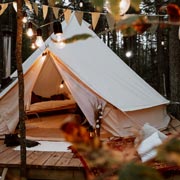 Once we’ve adopted Hygge at the nursery, it’ll look and feel warmer and far more welcoming, with softer, warmer lighting and a more homely atmosphere. Gone will be anything that looks sterile, cold or even harshly lit. Instead, expect to see soft furnishings including cushions, rugs and blankets. Look out for little nooks where children can gather in small groups to read, play or engage with each other or with staff. Hygge nurseries are also synonymous with dens and teepees, allowing children to ‘nest’ in calm, cosy spaces and corners. All these things will also deaden sound, reduce noise levels, and banish echoes, making for a much calmer setting entirely.
Once we’ve adopted Hygge at the nursery, it’ll look and feel warmer and far more welcoming, with softer, warmer lighting and a more homely atmosphere. Gone will be anything that looks sterile, cold or even harshly lit. Instead, expect to see soft furnishings including cushions, rugs and blankets. Look out for little nooks where children can gather in small groups to read, play or engage with each other or with staff. Hygge nurseries are also synonymous with dens and teepees, allowing children to ‘nest’ in calm, cosy spaces and corners. All these things will also deaden sound, reduce noise levels, and banish echoes, making for a much calmer setting entirely. We mentioned that Hygge brings people closer to nature and that will be evident not only outside but indoors too. We’ll ensure there are natural objects and materials for the children to explore and handle, including things like smooth pebbles, wood surfaces, pine cones and perhaps reed and wicker items. These will be lovely to handle and to be around, stimulating multiple senses, which is so important in the young. The introduction of appropriate plants will also
We mentioned that Hygge brings people closer to nature and that will be evident not only outside but indoors too. We’ll ensure there are natural objects and materials for the children to explore and handle, including things like smooth pebbles, wood surfaces, pine cones and perhaps reed and wicker items. These will be lovely to handle and to be around, stimulating multiple senses, which is so important in the young. The introduction of appropriate plants will also  Children will also be encouraged to be convivial, i.e. be friendly, inclusive, pleasant and welcoming to one another and to staff. We always try to foster a culture of mutual respect and equality, but the introduction of Hygge to the nursery will take this even further. Sharing and politeness are to be encouraged. Play will be calmer and more harmonious. With Hygge, growing friendships will naturally blossom. Hygge minimises conflict and leads to harmony, calmness and a very pleasurable day-to-day experience for everyone touched by it.
Children will also be encouraged to be convivial, i.e. be friendly, inclusive, pleasant and welcoming to one another and to staff. We always try to foster a culture of mutual respect and equality, but the introduction of Hygge to the nursery will take this even further. Sharing and politeness are to be encouraged. Play will be calmer and more harmonious. With Hygge, growing friendships will naturally blossom. Hygge minimises conflict and leads to harmony, calmness and a very pleasurable day-to-day experience for everyone touched by it.